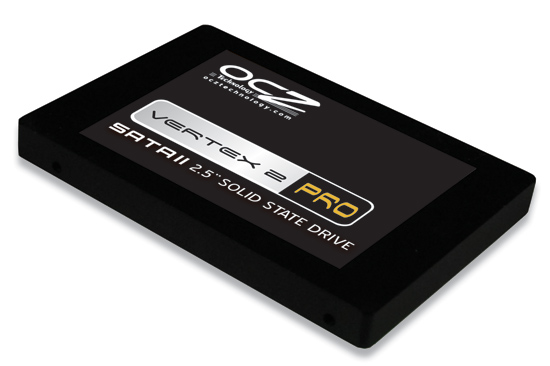OCZ's Vertex 2 Pro Preview: The Fastest MLC SSD We've Ever Tested
by Anand Lal Shimpi on December 31, 2009 12:00 AM EST- Posted in
- Storage
One thing AMD has taught me is that you can never beat Intel at its own game. Simply trying to do what Intel does will leave you confined to whatever low margin market Intel deems too unattractive to pursue. It’s exactly why AMD’s most successful CPU architectures are those that implement features that Intel doesn’t have today, but perhaps will have in a few years. Competing isn’t enough, you must innovate. Trying to approach the same problem in the same way but somehow do it better doesn’t work well when your competition makes $9B a quarter.
We saw this in the SSD space as well. In the year since Intel’s X25-M arrived, the best we’ve seen is a controller that can sort-of do what Intel’s can just at a cheaper price. Even then, the cost savings aren’t that great because Intel gets great NAND pricing. We need companies like Indilinx to put cost pressure on Intel, but we also need the equivalent of an AMD. A company that can put technological pressure on Intel.

That company, at least today, is SandForce. And its disciple? OCZ. Yep, they’re back.
Why I Hate New SSDs
I’ll admit, I haven’t really been looking forward to this day. Around the time when OCZ and Indilinx finally got their controller and firmware to acceptable levels, OCZ CMO Alex Mei dropped a bombshell on me - OCZ’s Vertex 2 would use a new controller by a company I’d never heard of. Great.
You may remember my back and forth with OCZ CEO Ryan Petersen about the first incarnation of the Vertex drive before it was released. Needless to say, what I wrote in the SSD Anthology was an abridged (and nicer) version of the back and forth that went on in the months prior to that product launch. After the whole JMicron fiasco, I don’t trust these SSD makers or controller manufacturers to deliver products that are actually good.

Aw, sweet. You'd never hurt me would you?
Which means that I’ve got to approach every new drive and every new controller with the assumption that it’s either going to somehow suck, or lose your data. And I need to figure out how. Synonyms for daunting should be popping into your heads now.
Ultimately, the task of putting these drives to the test falls on the heads of you all - the early adopters. It’s only after we collectively put these drives through hundreds and thousands of hours of real world usage that we can determine whether or not they’re sponge-worthy. Even Intel managed to screw up two firmware releases and they do more in-house validation than any company I’ve ever worked with. The bugs of course never appeared in my testing, but only in the field in the hands of paying customers. I hate that it has to be this way, but we live in the wild west of solid state storage. It’ll be a while before you can embrace any new product with confidence.
And it only gets more complicated from here on out. The old JMicron drives were easy to cast aside. They behaved like jerks when you tried to use them. Now the true difference between SSDs rears its head after months or years of use.
I say that because unlike my first experience with OCZ’s Vertex, the Vertex 2 did not disappoint. Or to put it more directly: it’s the first drive I’ve seen that’s actually better than Intel’s X25-M G2.
If you haven't read any of our previous SSD articles, I'd suggest brushing up on The Relapse before moving on. The background will help.










100 Comments
View All Comments
blowfish - Friday, January 1, 2010 - link
80GB? You really need that much? I'm not sure how much space current games take up, but you'd hope that if they shared the same engine, you could have several games installed in significantly less space than the sum of their separate installs. On my XP machines, my OS plus programs partitions are all less than 10GB, so I reckon 40GB is the sweet spot for me and it would be nice to see fast drives of that capacity at a reasonable price. At least some laptop makers recognise the need for two drive slots. Using a single large SSD for everything, including data, seems like extravagant overkill.Gasaraki88 - Monday, January 4, 2010 - link
Just as a FYI, Conan take 30GB. That's one game. Most new games are around 6GB. WoW takes like 13GB. 80GB runs out real fast.DOOMHAMMADOOM - Friday, January 1, 2010 - link
I wouldn't go below 160 GB for a SSD. The games in just my Steam folder alone go to 170 GB total. Games are big these days. The thought of putting Windows and a few programs and games onto an 80GB hard drive is not something I would want to do.Swivelguy2 - Thursday, December 31, 2009 - link
This is very interesting. Putting more processing power closer to the data is what has improved the performance of these SSDs over current offerings. That makes me wonder: what if we used the bigger, faster CPU on the other side of the SATA cable to similarly compress data before storing it on an X25-M? Could that possible increase the effective capacity of the drive while addressing the X25-M's major shortcoming in sequential write speed? Also, compressing/decompressing on the CPU instead of in the drive sends less through SATA, relieving the effects of the 3 GB/s ceiling.Also, could doing processing on the data (on either end of SATA) add more latency to retrieving a single file? From the random r/w performance, apparently not, but would a simple HDTune show an increase in access time, or might it be apparent in the "seat of the pants" experience?
Happy new year, everyone!
jacobdrj - Friday, January 1, 2010 - link
The race to the true 'Isolinear Chip' from Star Trek is afoot...Fox5 - Thursday, December 31, 2009 - link
This really does look like something that should have been solved with smarter file systems, and not smarter controllers imo. (though some would disagree)Reiser4 does support gzip compression of the file system though, and it's a big win for performance. I don't know if NTFS's compression is too, but I know in the past it had a negative impact, but I don't see why it wouldn't perform better if there was more cpu performance.
blagishnessosity - Thursday, December 31, 2009 - link
I've wondered this myself. It would be an interesting experiment. There are http://en.wikipedia.org/wiki/Comparison...systems#... (NTFS, Btrfs, ZFS and Reiser4). In windows, I suppose this could be tested by just right clicking all your files and checking "compress" and then running your benchmarks as usual. In linux, this would be interesting to test with btrfs's SSD mode paired with a low-overhead io scheduler like noop or deadline.What interests me the most though is SSD performance on a http://en.wikipedia.org/wiki/Log-structured_file_s... as they theoretically should never have random reads or writes. In the linux realm, there are several log-based filesystems (JFFS2, UBIFS, LogFS, NILFS2) though none seem to perform ideally in real world usage. Hopefully that'll change in the future :-)
blagishnessosity - Thursday, December 31, 2009 - link
correction:There are http://en.wikipedia.org/wiki/Comparison...systems#...">several filesystems that support transparent compression (NTFS, Btrfs, ZFS and Reiser4).
What interests me the most though is SSD performance on a http://en.wikipedia.org/wiki/Log-structured_file_s...">Log-based filesystem as they theoretically should never have random reads or writes.
(note to web admin: the comment wysiwig does not appear to work for me)
themelon - Thursday, December 31, 2009 - link
Note that ZFS now also has native DeDupe support as of build 128http://blogs.sun.com/bonwick/en_US/entry/zfs_dedup">http://blogs.sun.com/bonwick/en_US/entry/zfs_dedup
grover3606 - Saturday, November 13, 2010 - link
Is the used performance with trim enabled?